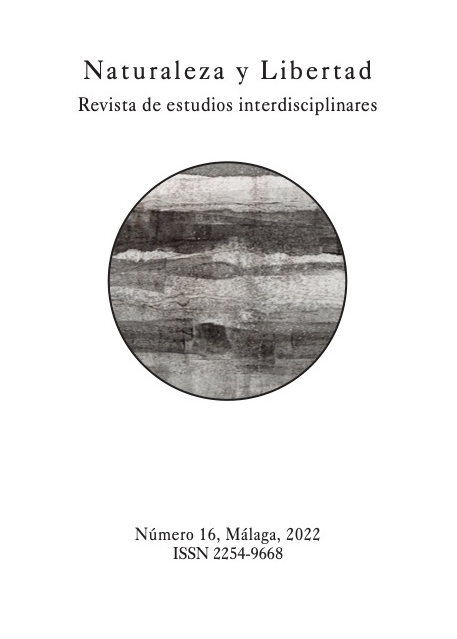Is technological development changing our being in the world?
An interdisciplinary reflection from Philosophy, Psychology and Sociology
DOI:
https://doi.org/10.24310/NATyLIB.2022.vi16.12947Keywords:
Technology, Human being, MediationAbstract
This article is an interdisciplinary reflection on the transformative role of technology for the human being. First, the experience of time and space is overviewed from a phenomenological approach. Second, the implication of technology on neurobiological circuits and the psychological outcomes of overstimulation are discussed. In third place, societal changes are analyzed through contemporary events such as polarization and virtuality. Finally, this article concludes with a phenomenological reflection that explores how subjectivity is perceived in its intimate and intersubjective condition.Downloads
Metrics
References
Berkeley, G., Principios del conocimiento humano, Barcelona: Orbis.
Boubeta, A. R., Ferreiro, S. G., Salgado, P. G., & Couto, C. B. (2015). «Variables asociadas al uso problemático de internet entre adolescentes», Salud Y Drogas, 15(1), pp. 25–38. https://doi.org/10.21134/haaj.v15i1.223
Cappuccio, M. L. (2017), «Mind-upload. The ultimate challenge to the embodied mind theory», Phenomenology and the Cognitive Sciences, 16(3), pp. 425–448. https://doi.org/10.1007/s11097-016-9464-0
Cortina, A., (2008) La Escuela de Fráncfort. Crítica y utopía, Madrid: Hermeneia.
Gidron, N., Adams, J., & Horne, W. (2018). How ideology, economics and institutions shape affective polarization in democratic polities. Annual Conference of the American Political Science Association.
Heidegger, M. (1997), Ser y tiempo,, Santiago de Chile: Editorial Universitaria.
Instituto Nacional sobre el Abuso de Drogas. (2020). Las drogas, el cerebro y la conducta: bases científicas de la adicción. Publicación digital.
Laercio, D. (2013), Vida y opiniones de los filósofos ilustres, Madrid: Grupo Anaya.
McNally, J., & Harrington, B. (2017). How millennials and teens consume mobile video. Proceedings of the 2017 ACM International Conference. https://doi.org/10.1145/3077548.3077555
Miller, J.A., (2011), Extimidad, Barcelona: Paidós.
Montag, C., Sindermann, C., Becker, B., & Panksepp, J. (2016), «An Affective Neuroscience Framework for the Molecular Study of Internet Addiction», Frontiers in Psychology, 7(1906), pp. 1-13. https://doi.org/10.3389/fpsyg.2016.01906
Moral, M. de la V., & Suárez, C. (2016), «Factores de riesgo en el uso problemático de Internet y del teléfono móvil en adolescentes españoles», Revista Iberoamericana de Psicología Y Salud, 7(2), pp. 69–78. https://doi.org/10.1016/j.rips.2016.03.001
O'Hara, K., Mitchell, A. S., & Vorbau, A. (2007). Consuming video on mobile devices. Proceedings of the SIGCHI Conference. https://doi.org/10.1145/1240624.1240754
Ortega y Gasset, J. (1914) Meditaciones del Quijote, Madrid: Biblioteca de la Residencia de Estudiantes, Madrid.
Pascal, B., (1986), Pensamientos, Madrid: Planeta.
Polo, L. (2006), Hegel y el posthegelianismo, Pamplona: Eunsa.
Ricoeur, P. (1990), Freud, una interpretación de la cultura, Madrid: Siglo XXI.
Toranzo, F. E., Marín, G. A., & Morán, C. G. (2018), «Relación entre las Bases Neurobiológicas de las Adicciones a Sustancias y las Tecnoadicciones», Anuario de Investigaciones de La Facultad de Psicología, 3(3), pp. 560–568.
Urabayen, J. (2001), El pensamiento antropológico de Gabriel Marcel: un canto al ser humano, Pamplona: EUNSA.
Downloads
Published
How to Cite
Issue
Section
License
Those authors who have publications with this journal, accept the following terms:
1. Copyright and licensing information are clearly described on the journal’s web site: all content published in Naturaleza y Libertad is open acces without limit, and are subject to the Attribution-NonCommercial-ShareAlike 4.0 International (CC BY-NC-SA 4.0) license. The full text of which can be consulted at https://creativecommons.org/licenses/by-nc-sa/4.0/
2. It is the responsibility of the authors to obtain the necessary permissions for the images that are subject to copyright. The authors whose contributions are accepted for publication in this journal will retain the non-exclusive right to use their contributions for academic, research and educational purposes, including self-archiving or deposit in open access repositories of any kind. The electronic edition of this magazine is edited by the Editorial de la University of Malaga (UmaEditorial), being necessary to cite the origin in any partial or total reproduction.
3. This journal allows and encourages authors to publish papers on their personal websites or in institutional repositories, both before and after their publication in this journal, as long as they provide bibliographic information that accredits, if applicable, your posting on it.
4. In no case will anonymous papers be published.





18.png)













